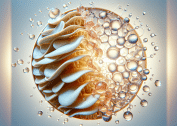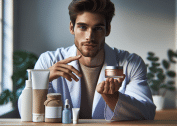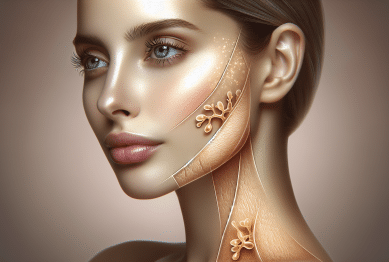Imagine discovering the secrets behind glowing skin, holistic self-care routines, and everyday wellness habits. This in-depth guide explores how integrating the latest approaches in skincare, nutrition, and lifestyle can support a clear complexion, boost confidence, and enhance your beauty from within.
The Foundation of Radiant Skin: Daily Rituals
Many people hope to unveil the smooth, bright skin they see in magazines, but sustainable results start with consistent daily habits. A thoughtful skincare routine helps maintain skin health by removing impurities, replenishing moisture, and protecting the skin barrier, which can improve the complexion’s overall tone and texture. Dermatologists suggest starting and ending each day with a gentle cleanser, followed by a moisturizer that’s appropriate for your skin type. Sunscreen is often seen as a non-negotiable step because it shields skin from UV rays, one of the chief contributors to premature aging and uneven pigmentation. Making these steps a habit can help many individuals sustain a luminous glow over time.
Personalizing your skincare doesn’t mean buying elaborate products. Instead, success often lies in understanding your skin’s needs and adjusting your ritual accordingly. For example, individuals with dry or sensitive skin benefit from fragrance-free and hydrating formulas, while those prone to oiliness might opt for lighter, non-comedogenic options. It’s also helpful to patch test new products to avoid irritation. As seasons and environments change, so should skincare routines; winter may call for richer creams, while summer might require increased sun protection and lightweight hydrators. A regular review ensures routines remain effective, supporting both wellness and beauty goals without overwhelming the budget.
Beyond topical care, mindful lifestyle choices further support radiant skin. Refreshing sleep, adequate hydration, and stress reduction all play significant roles. Experts often highlight how emotional well-being and consistent sleep patterns help regulate hormones that can impact skin clarity. Keeping a water bottle nearby serves as a simple reminder to drink more fluids, promoting a plump, healthy complexion. Meanwhile, practices like yoga or deep breathing can reduce stress and benefit both skin and overall wellness. Integrating these steps crafts a sustainable foundation for beauty and wellness—inside and out.
Nourishing Your Body for Beauty from Within
What you eat can have profound effects on skin health and natural beauty. Antioxidants, vitamins, and minerals found in colorful fruits and vegetables contribute to a brighter complexion by reducing oxidative stress. For example, vitamin C helps skin recover from damage and supports collagen production, leading to firmer, more youthful-looking skin. Eating a variety of nutrient-dense foods, including leafy greens, berries, nuts, and seeds, provides the building blocks your body needs for repair and rejuvenation. Integrating healthy fats, such as those from avocados and walnuts, further supports the skin barrier and imparts a healthy glow.
Hydration is a core pillar of wellness and beauty. Water assists in flushing out toxins, supporting digestion, and maintaining cellular health. Some people notice that when they drink enough water, their skin appears less dull and more vibrant. Herbal teas like green tea or chamomile offer skin-soothing antioxidants and can complement a hydration routine. Nutritionists commonly recommend aiming for a balanced diet rich in phytonutrients—plant-based compounds that can shield the skin from environmental stressors. Adopting these dietary habits can help elevate both confidence and natural allure over time.
Food sensitivities and processed ingredients can influence skin appearance, too. While it’s not necessary to eliminate entire food groups without proper guidance, being mindful of how certain ingredients affect your body can reveal helpful patterns. For some, dairy or high-glycemic foods may trigger breakouts or redness. Logging meals and tracking skin changes helps identify potential culprits. Working with a registered dietitian or healthcare provider can further clarify connections, empowering informed choices that benefit both inner wellness and outward beauty.
Holistic Wellness Practices to Enhance Your Glow
Holistic routines often go beyond the superficial, focusing on the connection between mind, body, and skin vitality. Mindfulness and self-care routines are widely recognized as powerful tools for reducing chronic stress that sometimes shows up on the skin as redness, irritation, or accelerated aging. Practicing regular meditation, expressive journaling, or even a soothing skincare ritual can foster emotional balance and improve self-image. Over time, many notice that such practices encourage not just a clearer complexion, but also lasting wellness and a sense of calm.
Movement is another essential part of holistic beauty. Physical activity increases circulation, feeding cells with oxygen and nutrients that help skin repair and renew. Whether it’s a brisk walk, gentle yoga, or structured strength training, regular exercise supports detoxification through sweating and can help regulate hormones that influence skin. Many wellness experts recommend making movement enjoyable, which encourages consistency—an essential ingredient for enduring results. Embracing exercise also boosts energy and self-esteem, radiating outward in your posture and presence.
Creating a supportive social environment fosters emotional wellness that shines through skin. Positive relationships and meaningful connections promote happiness, which is often reflected in a natural glow. Acts of kindness, community engagement, and simply spending quality time with friends can reduce anxiety and create a ripple effect of benefits, both psychologically and physically. Mindful social media use, taking regular breaks, and curating a digital space that uplifts rather than stresses can make a big difference. These holistic strategies knit together the physical and emotional threads of beauty and wellness.
Emerging Skincare Trends and Their Impact
Staying updated with skincare trends can open new doors to effective routines—but it’s important to discern which options truly serve your needs. Plant-based formulations, for example, have gained popularity as more people look for gentle yet powerful ingredients. Research shows that botanical extracts like green tea, chamomile, and aloe vera can calm irritation and protect against environmental harm. Meanwhile, the rise of probiotic skincare is linked to supporting the skin’s microbiome, which helps shield against breakouts and sensitivity. Understanding the science behind these trends empowers informed decisions, minimizing the risk of irritation while seeking radiant skin.
Microbiome-friendly skincare is part of a broader shift toward respecting natural body systems. Friendly bacteria on the skin form a critical barrier and help prevent imbalances that can lead to redness and discomfort. Many brands now offer cleansers and serums designed to preserve these beneficial microbes, using low-irritation ingredients and avoiding harsh detergents. Dermatologists recommend reading ingredient labels with care and consulting authoritative resources or professionals before trying new approaches. Making choices that nurture rather than strip the skin barrier often yields more reliable and lasting improvements.
Technology also plays an increasing role in wellness and beauty. From personalized skincare apps to wearable devices that monitor hydration, digital tools help track habits and measure progress. These innovations don’t replace expert advice but can offer insights into patterns you might otherwise miss. Embracing new technology alongside proven rituals can optimize routines, support motivation, and foster a holistic approach to self-care. Ultimately, blending time-tested wisdom with emerging science offers new possibilities for those seeking a beautiful, balanced lifestyle.
Creating a Balanced Self-Care Routine That Lasts
Maintaining beauty and wellness goals is often more about consistency than intensity. A balanced self-care routine considers personal needs, schedules, and preferences—making it sustainable for the long run. Setting manageable goals, such as a ten-minute morning routine or regular Sunday night self-care session, makes healthy habits feel rewarding rather than overwhelming. Organizational tools, like a journal or digital tracker, can keep progress visible and adaptation easy. By celebrating small wins, motivation often grows, turning daily rituals into lifelong anchors of well-being.
Listening to your body is key when building any self-care regimen. Some days may call for rest instead of rigorous activity, or soothing masks rather than exfoliation. Flexibility allows routines to shift with changing needs, whether related to stress levels, seasonal changes, or evolving goals. Experts often suggest treating self-care as a form of respect for oneself, not a checklist of tasks. This mindset shift can alleviate guilt and encourage true relaxation—both of which are vital for healthy, beautiful skin and inner calm.
Community support enhances adherence to self-care routines and overall wellness journeys. Engaging with friends, online forums, or wellness groups provides encouragement, accountability, and shared inspiration. Many find that connecting with others helps maintain momentum, especially during times when motivation dips. Sharing tips, victories, and challenges can turn self-care into a positive, social experience that benefits both appearance and spirit. In a world that often prizes the fast and the dramatic, slow and steady transformations grounded in self-kindness deliver powerful, lasting outcomes.
Choosing Quality Products Without Overwhelm
With shelves lined with endless skincare options, choosing the right products can feel daunting. Experts recommend starting simple: a gentle cleanser, a moisturizer, and a broad-spectrum sunscreen. Gradually incorporating serums or specialty products ensures you can observe how your skin responds and adjust as needed. Reading labels empowers savvy choices, with a focus on science-backed ingredients and formulations free from unnecessary additives. By prioritizing essentials, it’s easier to stick to a routine, avoid irritation, and achieve sustainable radiance.
Understanding terms like non-comedogenic, hypoallergenic, and fragrance-free can guide individuals toward appropriate selections, particularly for sensitive or acne-prone skin. When in doubt, resources from organizations such as the American Academy of Dermatology offer reliable insight into common concerns. Consulting with a board-certified dermatologist provides an additional layer of safety, especially when navigating issues like persistent breakouts or reactions. Sometimes, less is more—the fewer steps needed, the greater chance of sticking with your regimen without confusion or waste.
Eco-friendly and sustainable beauty products are becoming a favorite among those interested in wellness and environmental impact. Cruelty-free certifications, recyclable packaging, and clean ingredient lists are now widely available. Exploring local products can further support community businesses and foster a sense of connection. Investing in quality over quantity is both environmentally conscious and beneficial for skin health. Empowered with knowledge and intention, individuals can curate a beauty shelf that reflects their values and delivers lasting wellness.
References
1. American Academy of Dermatology Association. (n.d.). Skin care routines. Retrieved from https://www.aad.org/public/everyday-care/skin-care-basics/routine
2. Harvard T.H. Chan School of Public Health. (n.d.). Nutrition and immune function: Diet and skin health. Retrieved from https://www.hsph.harvard.edu/nutritionsource/skin-health/
3. National Institutes of Health. (n.d.). Mind and body approaches for stress and anxiety: What the science says. Retrieved from https://www.nccih.nih.gov/health/mind-and-body-approaches-for-stress-and-anxiety
4. U.S. Food & Drug Administration. (n.d.). Fact or fiction: What to know about products marketed as plant-based or ‘clean’. Retrieved from https://www.fda.gov/consumers/consumer-updates/fact-or-fiction-what-know-about-products-marketed-plant-based-or-clean
5. Centers for Disease Control and Prevention. (n.d.). Healthy hydration. Retrieved from https://www.cdc.gov/nutrition/data-statistics/know-your-limit-for-added-sugars.html
6. Mayo Clinic. (n.d.). Stress management. Retrieved from https://www.mayoclinic.org/healthy-lifestyle/stress-management/in-depth/stress-relief/art-20044456









